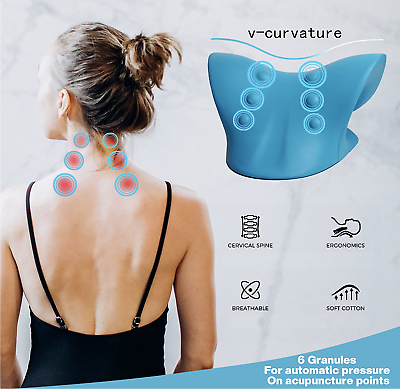The Influence of Anxiety on Neck Pain: Approaches for Decreasing Stress and Pain
In today's busy world, it's no trick that stress has become a widespread consider the onset and worsening of neck pain. The elaborate partnership between anxiety and muscular tissue tension usually leaves individuals seeking alleviation from the pain that takes place. By discovering targeted techniques focused on lowering tension and promoting relaxation, one can begin to attend to the origin causes of neck pain and job in the direction of an extra balanced state of well-being. Join us on a journey to untangle the impact of tension on neck pain and find efficient means to ease pain and boost total top quality of life.
Recognizing Stress-Related Neck Discomfort
Stress-related neck discomfort can materialize as tension, rigidity, or pain in the neck and shoulder location. The link between stress and neck discomfort lies in the body's physiological feedback to anxiety, which can result in muscle mass stress and tightness in the neck muscular tissues.

Identifying Common Tension Areas
Frequently experienced by individuals under stress and anxiety, tension locations in the body can provide useful insights right into the physical manifestations of mental stress. One usual tension location is the neck, where stress and anxiety typically shows up physically. Tension migraines, tight neck muscular tissues, and restricted array of movement are usual symptoms of stress-related neck tension. The shoulders are one more usual location where stress accumulates. Tension can trigger the muscular tissues in the shoulders to tighten up, leading to discomfort and pain. Furthermore, the upper back is susceptible to stress accumulation, specifically in people that experience persistent anxiety. Poor posture and prolonged sitting can exacerbate tension around. The jaw is also a typical area for stress-related tension, as many individuals clench their jaw or grind their teeth when worried. Understanding these usual tension locations can help people acknowledge the physical signs of anxiety and take steps to resolve them before they rise into persistent pain or pain.
Implementing Relaxation Methods
To successfully handle stress-related stress in the body, executing leisure methods is important. Relaxation strategies are important devices for lowering neck pain triggered by stress and anxiety. Deep breathing workouts can assist relax the mind and kick back tense muscles in the neck and shoulders (neck cloud). Exercising mindfulness reflection can likewise be advantageous in easing stress and anxiety and advertising leisure. Dynamic muscular tissue relaxation, where you methodically tense and after that relax various muscle teams, can release built-up stress in the neck area. Additionally, tasks like yoga exercise and tai chi integrate both physical activity and relaxation, making them efficient methods for decreasing stress and anxiety and neck pain. Taking routine breaks throughout the day to stretch and unwind can stop muscular tissue stiffness and stress from accumulating. By incorporating these leisure techniques into your everyday regimen, you can help handle stress and anxiety levels, decrease stress in the neck, and relieve discomfort connected with stress-induced neck discomfort.
Integrating Self-Care Practices
Integrating self-care methods is crucial for keeping total health and managing stress-related neck pain efficiently. Taking part in regular exercise, such as gentle stretching workouts or yoga exercise, can aid relieve stress in the neck and shoulders. Exercising excellent posture throughout the day and taking frequent breaks from prolonged resting or display time can additionally prevent strain on the neck muscular tissues.
In addition, prioritizing sufficient rest and establishing a consistent sleep routine can contribute significantly to reducing stress and anxiety levels and advertising relaxation. Developing a soothing going to bed regimen, such as reviewing a publication or taking a cozy bath, can help prepare the body and mind for restful rest. Additionally, keeping a balanced diet regimen rich in nutrients and staying hydrated can sustain total wellness and lower inflammation that may exacerbate neck pain.
Integrating mindfulness practices, such as deep breathing exercises or reflection, can help handle anxiety and advertise leisure. Requiring time for oneself, participating in leisure activities, and establishing borders to safeguard personal time are additionally vital facets of self-care that can contribute to article source reducing tension and minimizing neck pain.
Seeking Professional Aid
Exactly how can people successfully address persistent neck pain that is influencing their everyday life and well-being? Looking for specialist aid can be an essential action in managing and minimizing neck discomfort.
Chiropractic doctors concentrate on back control strategies to enhance positioning and lower stress in the neck location. Physical therapists provide targeted stretches and exercises to strengthen muscle mass, boost adaptability, and improve general neck function. Orthopedic specialists can supply innovative medical treatments such as injections or medical alternatives for extreme situations of neck pain.
Final Thought

Stress-related neck discomfort can materialize as tension, stiffness, or discomfort in the neck and shoulder area. The link in between stress and anxiety and neck discomfort exists in the body's physical response to stress, which can result in muscle stress and tightness in the neck muscles. Stress migraines, tight neck muscles, and restricted array of activity are common signs of stress-related neck stress. By integrating these relaxation techniques right into your everyday routine, you can aid handle stress and anxiety degrees, minimize tension in the neck, and alleviate pain linked with stress-induced neck pain.
